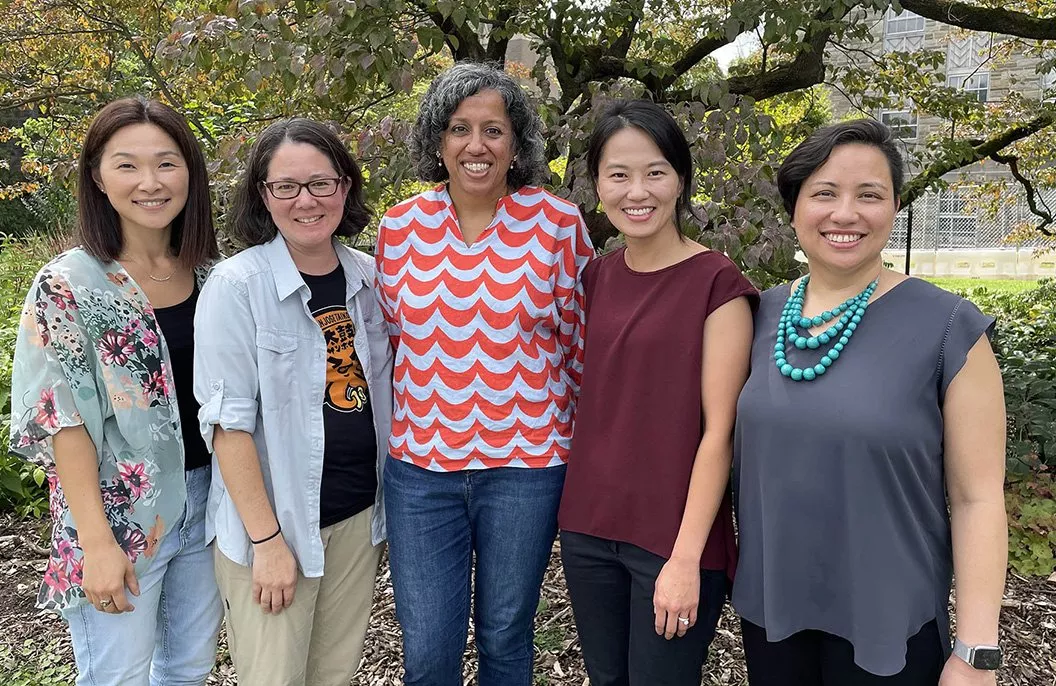
Excitement abounds for the new Asian American Studies Program at Swarthmore, Bryn Mawr, and Haverford, which builds upon existing courses and programs and creates new opportunities across the Tri-College Consortium.
“I love the fact that students and faculty will have a space to think, reflect, and learn more about what it means to be a racialized minority in the U.S., a space to explore what it means to be Asian American now, and the ways Asian American immigrant histories relate to global movements of peoples and ideas and cultures in the early 21st century," says Bakirathi Mani, professor of English literature and co-director of the new program.
The program centers on Asian American perspectives and contextualizes them within the wider field of critical race and ethic studies, including Black studies, Latinx studies, and Indigenous studies. It adds visibility and dimension to the work faculty members and students were already doing across disciplines at each of the colleges.
“I’m most excited about the ways in which having a formal Asian American Studies program will help to flourish, connect, and organize the already vibrant intellectual and social spaces across the three campuses focused on the histories, experiences, contributions, and perspectives of peoples of Asian and Pacific Islander descent in the U.S.,” says Shu-wen Wang, associate professor and chair of psychology at Haverford and co-director of the new program.
“We can now offer a cohesive and meaningful program of study, academic and curricular representation of our Asian American and Asian diaspora students, a synergistic network of faculty across the three campuses with innovative teaching and research interests, and a home for scholarly and community-facing programming that contributes deeply to the intellectual life of the colleges,” Wang adds.
Tri-Co faculty began laying the groundwork for the program in 2017, through a seed grant from the Mellon Foundation. Mani and Wang collaborated with Lei X. Ouyang, associate professor and chair of music at Swarthmore, and Heejung Park, associate professor of psychology at Bryn Mawr, to envision what a coordinated program might look like.
“Our work launching the program is the direct result of decades of students, faculty, and staff organizing, advocating, and calling for increased representation, visibility, and support across our institutions,” says Ouyang. “It is incredibly exciting to be at this moment now where students can begin declaring and planning for a minor in Asian American studies.”
The program advances longstanding efforts to make Asian American studies and, more broadly, comparative race and ethnic studies, more tangible on the three campuses, says Mani. There had been Asian American studies courses taught in English, psychology, and music across the three schools, as well as some student-run courses, but the Tri-Co faculty yearned to strengthen connections between these efforts and mobilize them.
“How do we show to our students that this is work you can do here; that this is a minor you can actually study here?” says Mani.
Adds Park: “I hope the program will edify our understanding of American cultures, histories, and people, and that it can serve as a bridge for interdisciplinary dialogues among Tri-Co students, faculty, and staff.”
Students interested in a minor in Asian American studies will be required to take six courses across three fields: Asian American histories, culture and experiences; comparative race and ethnic studies, including courses in Latinx studies and Black studies; and the global migrations of people from Asia to the Americas.
Unique in its construction, the curriculum aims to “offer interdisciplinary opportunities for all of our students to more fully engage with critical issues of race and ethnicity in America as part of a liberal arts education that prioritizes diversity and inclusion,” says Wang.
The program provides “a point of entry for new faculty and students engaging in Asian American studies to join as they arrive across our campuses,” says Ouyang. And its infrastructure widens connections with co-curricular programming, such as the Intercultural Center at Swarthmore and the efforts of student affinity groups at the three schools.
“It’s exciting for student organizations to be able to collaborate with one another across the three campuses, to mobilize for political issues, for social issues, and, more broadly, to engage with the Asian American experience,” says Mani. “There’s a real collective power in that.”
The colleges’ scale and close collaborations between students and faculty eased the creation of the program, says Mani, who hopes it becomes a model for not just future Tri-Co collaborations but those at liberal arts colleges nationwide.
“It’s an example of how you can pull together knowledge and resources to create a program that reflects the needs of our students,” she says, “and offer faculty opportunities to showcase their innovative research, through teaching and curricular programming.”